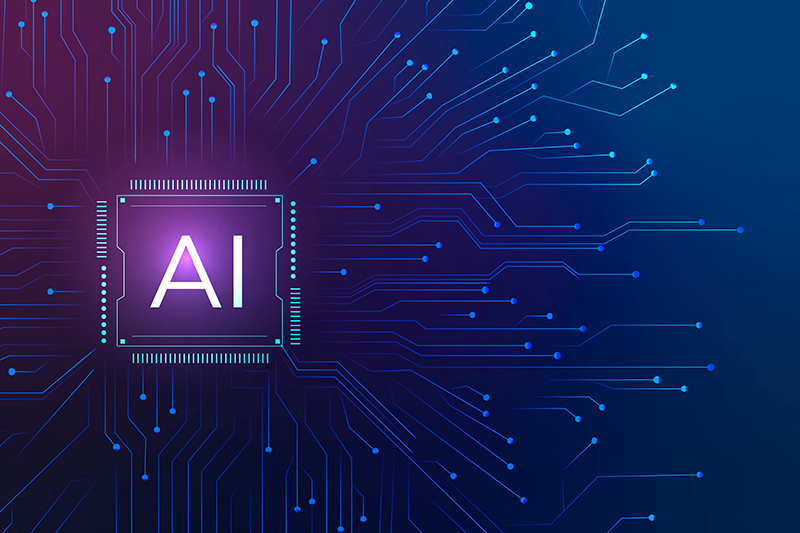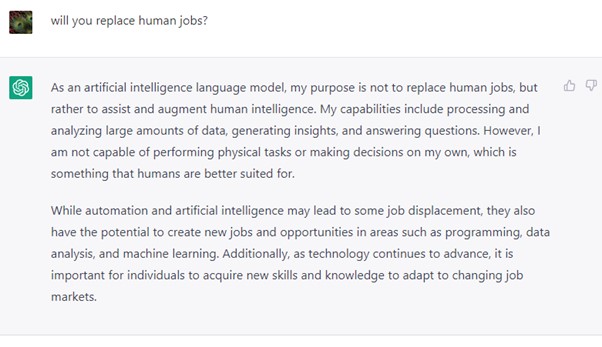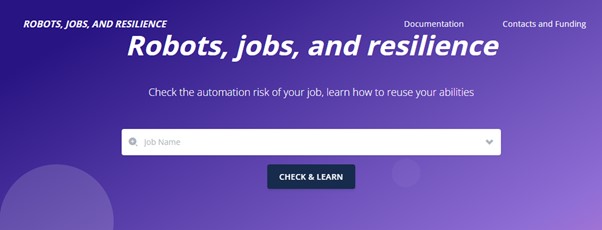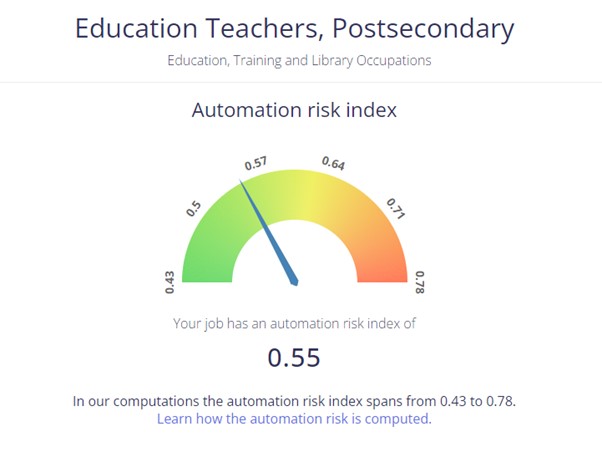The impact of artificial intelligence on the workforce is a hot topic to discuss in businesses across the world. Can a software bot eliminate human jobs? It is mainly due to the launch of ChatGPT and its ability to perform human professional tasks such as writing emails and more, fears of software eliminating human jobs have made waves across the globe. Created by OpenAI, ChatGPT uses AI and reams of data from the internet to create answers to questions posed by human users.
There is a serious growing concern that technology will replace human jobs in the near future. However, this is what ChatGPT says –
Ranging from document digitization to document processing and voice assistance, there are many applications of AI in the real world.
Is Your Job Safe? Top 20 Occupations at Risk
Mail Online discussed a recent study published by Princeton University in New Jersey, which reveals the careers that face the highest risk of being replaced by AI. The study reveals a list of the 20 occupations that are at the highest risk with call center workers, English and History teachers topping the list.
The 10 AI applications that were included in the study are – abstract strategy games, real-time video games, image recognition, visual question answering, image generation, reading comprehension, language modeling, translation, speech recognition, and instrumental track recognition.
Here’s a list of the top 20 occupations that are at risk
- Telemarketers
- English Language and Literature Teachers, Postsecondary
- Foreign Language and Literature Teachers, Postsecondary
- History Teachers, Postsecondary
- Law Teachers, Postsecondary
- Philosophy and Religion Teachers, Postsecondary
- Sociology Teachers, Postsecondary
- Political Science Teachers, Postsecondary
- Criminal Justice and Law Enforcement Teachers, Postsecondary
- Sociologists
- Social Work Teachers, Postsecondary
- Psychology Teachers, Postsecondary
- Communications Teachers, Postsecondary
- Political Scientists
- Area, Ethnic and Cultural Studies Teachers, Postsecondary
- Arbitrators, Mediators and Conciliators
- Judges, Magistrate Judges and Magistrates
- Geography teachers, Postsecondary
- Library Science Teachers, Postsecondary
- Clinical, Counseling, and School Psychologists
Telemarketers top the list of jobs at risk, as more and more companies are already using AI-powered chatbots for this position. Of the 20 occupations listed in the study, 14 are higher education teachers in various disciplines, including geography, religion, history, English, and sociology.
For the insights, the team used an AI occupational exposure measurement. The team noted that ‘occupations in the field of education are likely to be relatively more impacted by advances in language modeling than other occupations.’
Based on the findings, the researchers developed a tool that revealed the automation risk of your job, and how you could reuse your abilities.
How Do Judges Use AI?
Though AI tools cannot replace human judges and lawyers, it is useful in the courtroom in many ways. This software can gather research, which saves the judge’s time from going through legal books manually.
The latest news is that a Colombian judge used ChatGPT to decide on a case involving an autistic child. Judge Juan Manuel Padilla Garcia was asked to rule whether a health insurance company could deny paying fees for medical appointments, therapy and transportation for an autistic boy.
The judge asked the bot: ‘Is autistic minor exonerated from paying fees for their therapies?’, and it answered: ‘Yes, this is correct. According to the regulations in Colombia, minors diagnosed with autism are exempt from paying fees for their therapies.’
With this experience, Padilla said that ChatGPT and other such programs could be useful to ‘facilitate the drafting of texts’. He said he believed other judges would also use ChatGPT for research, as he did.
Some Jaw-dropping News
There is evidence that AI can even take the role of a government adviser. Recent news is that ‘ION’, an artificial intelligence assistant has been introduced as ‘new honorary’ adviser of the Romanian Prime Minister Nicolae Ciucă.
Named as ‘Big Brother’, this robot developed by Romanian researchers will scan social networks to inform the government ‘in real time of Romanians’ proposals and wishes.
A government document has highlighted that ION will use technology and artificial intelligence to capture opinions in society using data publicly available on social networks.
The world’s first AI Government adviser, ION allows the citizens of Romania to deliver their thoughts through a government website, social media, and specific locations. The robot will combine the data received and create reports for further consideration.
Household Chores May Also Be Automated
Can you believe that even household chores may be automated? According to a study led by the University of Oxford, almost 40% of time spent on household chores will be automated by 2033.
Based on this study, grocery shopping is the most ‘automatable’ household task, and childcare is the least automatable domestic task. According to the authors, “Our research suggests that on average around 39% of our time spent on doing domestic work can be automated in the next ten years. The degree of automation varies substantially across different types of work, however: Only 28% of care work, including activities such as teaching your child, accompanying your child, or taking care of an elderly family member, is predicted to be automated. Yet 44% of housework, including cooking, cleaning, and shopping, are expected to be automatable”.
How Do We Compete with AI?
While it is true that AI has the potential to automate many tasks, it cannot do everything that humans can do, such as creative thinking, communicating, collaborating, synthesizing, and making decisions the way a human can. However, we should know how to use this technology to complete our job efficiently.
Whether you run a document scanning company or any other business, make sure to educate your employees about the technological changes AI will bring and train them to adopt the current skills that customers demand in order to make tasks easier and improve the overall customer experience.
By embracing AI in the BPO industry, you can streamline operations, enhance efficiency, and deliver exceptional services that meet the evolving needs of your clients.








